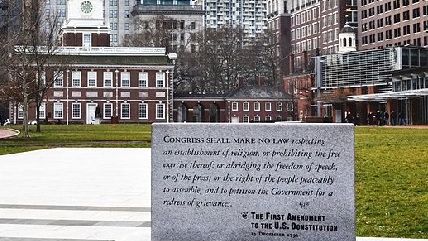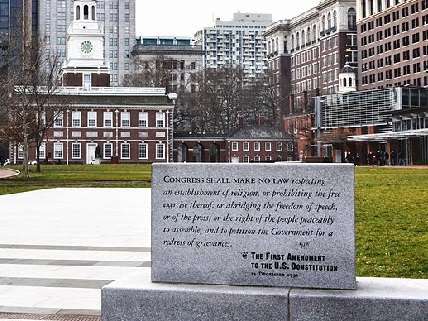Campaign Finance Curbs and Bipartisan Censorship
Censorship is a bipartisan affair.


Congressional Democrats are lining up behind a constitutional amendment to allow restrictions on campaign contributions and spending, and Republicans, to their everlasting credit, are opposed. They agree with the Supreme Court that limits like these are limits on speech, and they think it would be a mistake to amend the Constitution to abridge freedom of speech.
This position is particularly welcome because it represents something of a reversal by the GOP—not on regulating campaign finance, but on censoring speech. Republicans, oddly, have made the reversal without acknowledging—or perhaps even realizing—what they've done.
The amendment, sponsored by Sen. Tom Udall of New Mexico and approved by the Judiciary Committee, is intended to overturn the Supreme Court's 2010 Citizens United decision. In that case, the court said corporations and labor unions may spend as much as they want on "independent expenditures" to elect or defeat candidates. This measure would allow Congress to impose limits on contributions to candidates, spending by candidates and spending by anyone trying to influence the outcome of an election.
It would have a stifling effect on political debate by curbing ads about those running and the issues at stake. "It is intended to limit speech about elections, and it would do just that," legendary First Amendment lawyer Floyd Abrams told the Senate Judiciary Committee in June. It "would shrink the First Amendment and in doing so set a precedent that would be both disturbing and alarming."
Abrams, who has represented such organs of the mainstream media as The New York Times, ABC, NBC, and CBS, does not often find himself in the warm embrace of conservatives. But on this issue, he is. Of Udall's 48 co-sponsors, not one is a Republican.
GOP senators staunchly oppose the amendment on principle. "Free speech creates a marketplace of ideas in which citizens can learn, debate and persuade fellow citizens on the issues of the day," Charles Grassley of Iowa, the ranking Republican on the Judiciary Committee, said. The supporters of the amendment, however, "want to punish, intimidate and silence those with whom they disagree."
Texas Sen. John Cornyn tweeted mournfully: "Words I never expected to write: the Senate Judiciary Committee is voting now on amending the Bill of Rights." Sen. Jeff Sessions of Alabama has praised the Citizens United ruling, in which, he said, "the court's traditional wing protected the right to freedom of speech, and the progressive wing voted to protect government power."
All eight Republicans on the committee voted against the amendment, including Sessions, Cornyn, Orrin Hatch of Utah and Lindsey Graham of South Carolina.
It's heartening to hear these sentiments from Grassley and his GOP colleagues, and not just because they are on the right side of the issue. It's also because their arguments are the opposite of what they were saying a few years ago, when another constitutional amendment was on the table.
That one would have allowed Congress to ban desecration of the American flag. It came after the Supreme Court ruled that flag-burning is a form of expression protected by the Constitution. "If there is a bedrock principle underlying the First Amendment, it is that the government may not prohibit the expression of an idea simply because society finds the idea itself offensive or disagreeable," said the court.
The amendment failed in the Senate in 2006, as it had before, despite overwhelming GOP support. (One commendable exception: Mitch McConnell of Kentucky, who also opposes the campaign finance amendment.) Grassley voted for it. So did Cornyn, Sessions and Graham. Hatch has introduced the amendment nine times, most recently in 2013.
They did all this even though the criticisms leveled against the campaign finance amendment are equally applicable to the flag amendment. Cornyn was not so shocked by the idea of amending the Bill of Rights then; in fact, he liked it.
In that context, it was Sessions rather than liberal justices who chose government over freedom of speech. Grassley was among those back in 2006 eager to "punish, intimidate and silence those with whom they disagree."
These senators and their allies insisted that flag-burning was not really speech and undermined democracy. Today, supporters of the campaign finance amendment argue that election spending is not really speech and undermines democracy.
What it boils down to is that both sides find some types of political communication offensive to them and therefore undeserving of protection. Censorship is a bipartisan affair.


Show Comments (39)